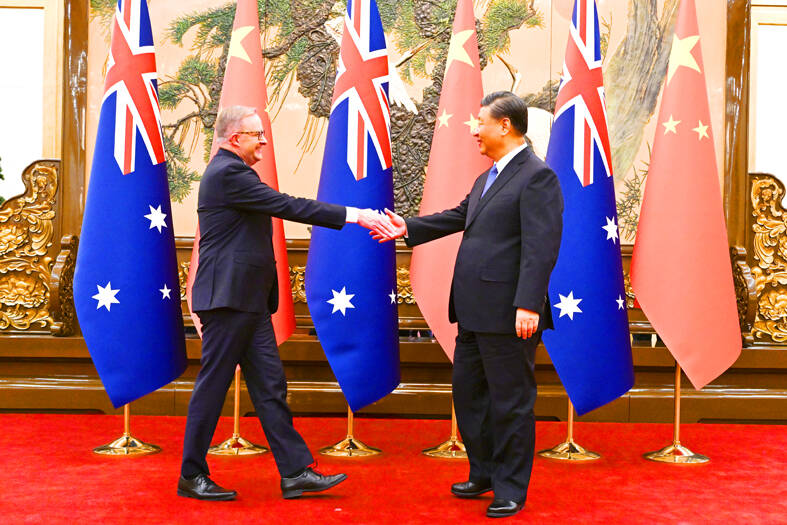The leaders of Australia and China yesterday welcomed the improvement in relations between their countries in the past year and emphasized the importance of engaging with each other, despite differences on issues such as defense.
Australian Prime Minister Anthony Albanese is making the first visit by an Australian leader to China in seven years in a sign of how low relations fell and how they have begun to stabilize.
China, a major market for Australia, has lifted some trade restrictions on Australian products since Albanese’s first meeting with Chinese President Xi Jinping (習近平) in Indonesia in November last year.

Photo: AAP via AP
“The progress we have made in advancing our relationship over that time has been unquestionably very positive,” Albanese said in opening remarks to Xi before the media. “Trade is flowing more freely to the benefit of both countries.”
Xi said that both sides had resumed exchanges of views and worked out some problems.
“The China-Australia relationship has embarked on the right path of improvement and development,” Xi said. “I’m heartened to see that.”
Relations nosedived in recent years as suspicions of Chinese interference in Australian politics increased. China, in turn, was angered by Australia’s call for an inquiry into the origins of the COVID-19 virus.
China levied tariffs and unofficial trade barriers that are estimated to have cost Australian exporters up to A$20 billion (US$13 billion) a year. Those barriers have since been substantially reduced and now cost about A$2 billion.
Even as Albanese has largely sounded upbeat during his visit, Australia is still actively pursuing a security partnership with the UK and the US that China views as an attempt to counter its influence in the region.
Albanese yesterday underscored the importance of high-level dialogue and people-to-people links.
“Where differences arise, it’s important that we have communication,” Albanese told Xi. “From communication comes understanding.”
Albanese’s visit comes near the 50th anniversary of the first trip by an Australian prime minister to China.
“Your visit this time is highly significant, as it builds on the past and ushers in the future,” Xi told Albanese.
Albanese noted the 1973 visit of then-Australian prime minister Gough Whitlam in a post on X that included photos of him and his entourage visiting the Temple of Heaven historic site.
“Since he visited the Temple of Heaven in Beijing, much has changed,” Albanese wrote.
“But what is constant is that engagement between our two countries remains important,” he wrote.

The US government has signed defense cooperation agreements with Japan and the Philippines to boost the deterrence capabilities of countries in the first island chain, a report by the National Security Bureau (NSB) showed. The main countries on the first island chain include the two nations and Taiwan. The bureau is to present the report at a meeting of the legislature’s Foreign Affairs and National Defense Committee tomorrow. The US military has deployed Typhon missile systems to Japan’s Yamaguchi Prefecture and Zambales province in the Philippines during their joint military exercises. It has also installed NMESIS anti-ship systems in Japan’s Okinawa

‘WIN-WIN’: The Philippines, and central and eastern European countries are important potential drone cooperation partners, Minister of Foreign Affairs Lin Chia-lung said Minister of Foreign Affairs Lin Chia-lung (林佳龍) in an interview published yesterday confirmed that there are joint ventures between Taiwan and Poland in the drone industry. Lin made the remark in an exclusive interview with the Chinese-language Liberty Times (the Taipei Times’ sister paper). The government-backed Taiwan Excellence Drone International Business Opportunities Alliance and the Polish Chamber of Unmanned Systems on Wednesday last week signed a memorandum of understanding in Poland to develop a “non-China” supply chain for drones and work together on key technologies. Asked if Taiwan prioritized Poland among central and eastern European countries in drone collaboration, Lin

ON ALERT: Taiwan’s partners would issue warnings if China attempted to use Interpol to target Taiwanese, and the global body has mechanisms to prevent it, an official said China has stationed two to four people specializing in Taiwan affairs at its embassies in several democratic countries to monitor and harass Taiwanese, actions that the host nations would not tolerate, National Security Bureau (NSB) Director-General Tsai Ming-yen (蔡明彥) said yesterday. Tsai made the comments at a meeting of the legislature’s Foreign Affairs and National Defense Committee, which asked him and Minister of National Defense Wellington Koo (顧立雄) to report on potential conflicts in the Taiwan Strait and military preparedness. Democratic Progressive Party (DPP) Legislator Michelle Lin (林楚茵) expressed concern that Beijing has posted personnel from China’s Taiwan Affairs Office to its

BACK TO WORK? Prosecutors said they are considering filing an appeal, while the Hsinchu City Government said it has applied for Ann Kao’s reinstatement as mayor The High Court yesterday found suspended Hsinchu mayor Ann Kao (高虹安) not guilty of embezzling assistant fees, reducing her sentence to six months in prison commutable to a fine from seven years and four months. The verdict acquitted Kao of the corruption charge, but found her guilty of causing a public official to commit document forgery. The High Prosecutors’ Office said it is reviewing the ruling and considering whether to file an appeal. The Taipei District Court in July last year sentenced Kao to seven years and four months in prison, along with a four-year deprivation of civil rights, for contravening the Anti-Corruption